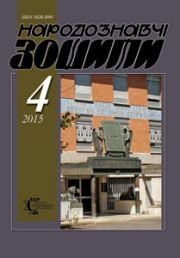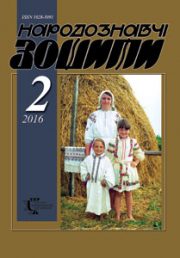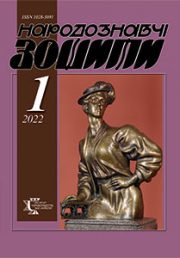The Ethnology Notebooks. 2021. № 6 (162), 1367—1375
UDK027.1:94(=161.2)(410)”19/20″(092)
DOI https://doi.org/10.15407/nz2021.06.1367
KRAVETS Danylo
- ORCID ID: https://orcid.org/0000-0002-1963-9678
- candidate of Historical Sciences,
- Researcher of Manuscript Department at Vasyl Stefanyk
- Lviv National Scientific Library of Ukraine,
- assistant lecturer of the Department of History,
- museology and cultural heritage
- of «Lviv Polytechnic» National University,
- Contacts: e-mail: Danylo.M.Kravets@LPNU.UA
Abstract. Introduction. Book collecting including seeking, locating, acquiring, organizing, cataloging, displaying, storing, and maintaining books are of interest to a given collector.
Problem Statement. The study of personal book collections of Ukrainian public and cultural figures as a component of Ukrainian monuments through the prism of the spiritual preferences of their owners today is an important and urgent task for bibliographers and historians.
Purpose. The objective of this publication is to analyze the rocks, structure and history of the formation of a private book collection of M. Demkovych-Dobrianskyi in the context of the creation of diaspora book collections of the second half of the twentieth century.
Methods. The article uses mainly historical-cultural and comparative methods, as well as elements of structural-typological and other methods inherent in historical science.
Results. The paper characterizes the content of the personal library of Mykhaylo Demkovych-Dobrianskyi (1905—2003) — famous historian, chief-editor of the Ukrainian edition of Radio Liberty, publicist, public and political activist. After his death the bulk of this collection was transferred to the library of the UCUniversity in Lviv (since 2017 The Metropolitan Andrey Sheptytskyi Center). Part of it stored at the department of manuscripts of Vasyl Stefanyk Lviv National Scientific Library of Ukraine.
Conclusion. Private book collections are created under the influence of enthusiastic interest in books, occupying an important place in the system of cultural values of society. The social significance of private book collections is that they are the basis for the formation of public libraries, focusing on preserving the cultural heritage of the nation for future generations. From the very beginning of his journalistic carrier M. Dobrianskyi began to write book reviews. Living in immigration, the journalist followed the appearance of new publications by Ukrainian authors and works related to Ukraine’s history, culture, economy, etc. M. Demkovych-Dobrianskyi was a bibliophile and built up a private collection (arguably the largest among Ukrainians in the UK) covering generally history, political science, culture, philosophy and other subjects. Samizdat editions by USSR dissidents were the significant part of M. Dobrianskyi personal library. Since 1960s, M. Dobrianskyi, as the editor-in-chief of the Ukrainian Radio Liberty, began collecting Ukrainian self-published publications. Radio Liberty became one of the few Western media outlets that broadcast Ukrainian Soviet samizdat. A large part of M. Dobryansky’s library is decorated with his bookplate (ex-libris), and many editions contain gift inscriptions of the authors.
Keywords: M. Demkovych-Dobrianskyi, private library, book, Ukrainian diaspora, samizdat.
Received 7.09.2021
REFERENCES
- Burke, P.(Ed.).(2013). New Perspectives on Historical Writing. Kyiv [in Ukrainian],
- Lisova, I. (2015). Value characteristics of a private book collection. Actual problems of the humanities and natural sciences (Odesa, April 03—04, 2015) (Pp. 122—125). Odessa [in Ukrainian].
- Lisova, I. (2012). Private book collection: theoretical approaches to the definition. Scientific notes of Rivne State Humanitarian University (Issue 18, pp. 253—258) [in Ukrainian].
- Kravets, R. (2003, 7 march). Mykhaylo Demkovych-Dobrianskyi dies. Svoboda (P. 30) [in Ukrainian].
- Department of manuscripts at Vasyl Stefanyk Lviv National Scientific Library of Ukraine. F. 298. Act: «Dymyd Mykhaylo. Letters to M. Demkovych-Dobrianskyi» [in Ukrainian].
- Kravets, D. (2017). Archive of Mykhaylo Demkovych-Dobrianskyi in the Department of manuscripts of Vasyl Stefanyk Lviv National Scientific Library of Ukraine. Notes of Vasyl Stefanyk Lviv National Scientific Library of Ukraine (Issue 9, pp. 474—485) [in Ukrainian].
- Department of manuscripts at Vasyl Stefanyk Lviv National Scientific Library of Ukraine. F. 298. Act: «Letters of M. Demkovych-Dobrianskyi to Stepan Vytvytskyi» [in Ukrainian].
- Stepien, S. (1996). Political life of Galicia and Metropolitan Szeptycki (on the margin of the book of Mykhaylo Demkowych-Dobrianskyi, Potocki and Bobzynski Emperial Governors of Galicia 1903—1913, Rome 1987, Ukrainian Catholic University of St. Kliment the Pope, pp. 132). Biuletyn informacyjny (Poludniowo-Wschodni Instytut Naukowy in Przemysl), 2, 221—232 [in Polish].
- Department of manuscripts at Vasyl Stefanyk Lviv National Scientific Library of Ukraine. F. 298. Act: «About the book «Ukraine and Russia» (List of institutions to present)» [in Ukrainian].
- Department of manuscripts at Vasyl Stefanyk Lviv National Scientific Library of Ukraine. F. 298. Act: «Riabchuk Mykola. Letters to M. Demkovych-Dobrianskyi» [in Ukrainian].
- Pokalchuk, Yu. (1991). Ukraine and Russia: yesterday and today. Slovo i chas (Part 7, pp. 78—79) [in Ukrainian].
- Kis’ R. (1998). The end of third Rome (Russian messianic idea on the edge of the century). Lviv [in Ukrainian].
- Dobrianskyi, M. (1980). Keine Kameradern. the fate of Soviet soldiers in Hitler’s captivity. Visti Kombatanta, 3—4, 3—4 [in Ukrainian].
- Department of manuscripts at Vasyl Stefanyk Lviv National Scientific Library of Ukraine. F. 298. Act: «Dobrianskyi Mykhaylo. Business card of the nation. Encyclopedia of Ukrainian Studies» [in Ukrainian].
- Demkovych-Dobrianskyi, M. (1986). Werschler, Iwo Z dziejуw obozu belwederskiego. Tadeusz Holуwko, zycie i dzialalnosc, Warszawa, 1984. Vidnova, 4, 11—14).Munich [in Ukrainian].
- Department of manuscripts at Vasyl Stefanyk Lviv National Scientific Library of Ukraine. F. 298. Act: «Conversation between M. Demkovych-Dobrianskyi and Bohdan Nahailo (Part II: 1930s») [in Ukrainian].
- Department of manuscripts at Vasyl Stefanyk Lviv National Scientific Library of Ukraine. F. 298. Act: «Dobrianskyi M. Hetman’s statehood and Russian centralism. Review. Zenon E. Kohut. Russian centralism and Ukrainian autonomy. Imperial absorption of the Hetmanate 1760s—1830s. Cambridge, 1988 [in Ukrainian].
- Demkovych-Dobrianskyi, M. (1983, 10 april). When did Rus come from? Ukrainski Visti (P. 3) [in Ukrainian].
- Department of manuscripts at Vasyl Stefanyk Lviv National Scientific Library of Ukraine. F. 298. Act: «Dobrianskyi M. Review: R. Conquest «Harvest of Sorrow», London, 1986» [in Ukrainian].
- Dobrianskyi, M. (1966). Pierre Teilhard de Chardin. Lysty do pryiateliv, 1—2, 2—4 [in Ukrainian].
- Sorokovski, A. Brief history of Ukrainian Patriarchate movement. Retrieved from: http://www.patriyarkhat.org.ua/andrij-sorokovskyj-narys-istoriji-ukrajinskoho-patriyarhalnoho-ruhu/ [in Ukrainian].
- Removska, O. (2015). Radio Liberty speaking. Kyiv [in Ukrainian].
- Department of manuscripts at Vasyl Stefanyk Lviv National Scientific Library of Ukraine. F. 298. Act: «Dobrianskyi M. «Samizdat victory». Commemorattion Day June 15 1975 speech in London [in Ukrainian].
- Dobrianskyi M. Memoirs of Danylo Shumuk. Our Voice. 1975. № 2. P. 3–5.
- LNBU named after V.Stefanyk. Department of manuscripts. F. 298. Spr. «Radio programs M. Dobriansky «Ukraine between the past and the future». 111 arch.
- LNBU named after V. Stefanyk. Department of manuscripts. F. 298. Spr. «Ivanychuk Roman. Letters to M.Demkovych-Dobriansky». 9 arch.
- LNBU named after V.Stefanyk. Department of manuscripts. F. 298. Spr. «The resentation of Club of Ukrainian Book. Dear friends of the Ukrainian book!» 1 arch.
- Chronicles. Shevchenko Scientific Society, 9.4.1949-31.12.1963. Exp. 77. Paris; Toronto; New York; Sydney. 1964. 59 s.
- Nеsterenko P. Exlibris, as an essay on the history of Culture of Ukraine, a complex of spiritual achievements of society. ART PLATFORM. 2020. Ex. 2. P. 162–179.
- LNBU named after V. Stefanyk. Department of manuscripts. F. 298. Spr. «Demkovych-Dobrianskyi M. Letters to Igor Riy “. 2 arch.







